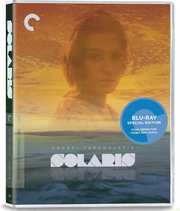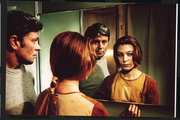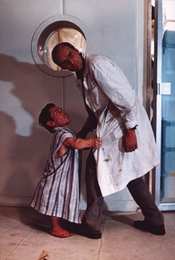Review for Solaris (1972)
This release of ‘Solaris’ is not the one that may spring immediately to mind (the 2002 James Cameron produced, Soderbergh directed version starring George Clooney) but the original adaptation by Russian Director, Andrei Tarkovsky. Despite being a less accurate reflection of the sci-fi novel by Stanislaw Lem, it is a brilliant piece of work, outshining the later version and indeed, probably bettering just about anything else you are likely to watch this year – or any year. It’s a stunning piece of work by any yardstick.
It’s all the more incredible that such a powerful film should be financed and produced under the watchful eye of a restrictive soviet communist regime – but it was. Tarkovsky, even from his earliest days out of film school, seemed blessed with such opportunity and, whilst his films could hardly be seen to support the hegemony, they did little to criticise it either. His films, or at least the few I have seen, seem far more focused on deeper, human issues that have more to do with our position within an infinite cosmos than they do about destabilising a political hierarchy.
Maybe that, above all else, was what attracted Tarkosvky to ‘Solaris’ in the first place. In some respects this is pure sci-fi. It features a man visiting an experimental space station just above the planet ‘Solaris’. But it is really a very human psychological drama, allowing Tarkosvky to really explore the human condition – its purpose and function – much in the same way that he did so brilliantly in ‘Stalker’. Imbued with a slightly surreal dream-like quality, its easy to see the film’s appeal to other great director’s like Ingmar Bergman (who was a huge fan) and David Lynch, who must surely have devoured this among Tarkosvky’s other works before embarking on his own unique foray into film. With fans like that, you just know this is going to be good.
Once again, the film is full of paused and pensive moments – often involving a shot of some eternally flowing part of nature, like plant-life in water or wind pushing through a field of long grass, or just a long shot of a murky puddle. The framing of so many shots in Solaris are almost painterly and the camera, often on the move, will often settle on a perfectly composed set piece. It’s a masterful piece of work.
The film is often set up against Kubrick’s 2001: A Space Odyssey which was produced (by the west) at around the same time. But as Tarkovsky never tired of pointing out, his film was intended as almost the polar opposite of Kubrick’s clean, clinical white vision of the future. ‘Solaris’ uses a space station that is falling apart at the seams; worn out like the inhabitants of the vessel – often looking like a student’s untidy flat. Of course, ‘Solaris’ was produced at a fraction of the cost of 2001 – and maybe this was a feature too. For my money, both films are brilliant in their own ways but the comparison is somewhat irresistible. They are both incredibly thought-provoking films where life is seriously questioned, as are notions of reality and time. This is heavy stuff.
But for all the high-brow philosophising, there is also a ‘Twilight Zone’-like element to ‘Solaris’ which makes it incredibly enjoyable. What is going down at the space station? Why are so few people still alive? The remaining three residents are sending very weird transmissions to ground-control and it’s agreed that someone should fly up there to investigate.
Cosmonaut psychologist, Kris Kelvin (Donatas Banionis) takes up the challenge but when he arrives, he discovers that the person he was hoping to meet with has committed suicide. It seems that those aboard are having very realistic hallucinations of people appearing aboard the craft with them – horribly realistic ones that defy logic.
Kelvin starts to see and hear what appears to be his dead wife, Hari (who also committed suicide). Although he knows that she must be little more than an illusion, she shares all Hari’s mannerisms and memories. From her side, she is confused too. How has she come to exist? How does she have feelings for Kelvin? Kris begins to fall in love with his wife all over again and starts questioning why they split shortly before her suicide. Trying to rid himself of the apparition, he sends her into space in an escape pod but she soon returns, back in his living quarters as if nothing is happen. When she rips her arms apart trying to follow Kris through a metallic door, she instantly heals. He and she know that it’s not real – just a figment of his unconscious made real. Or is it? And what does the primordial, swirling ocean below have to do with it all?
Doctor Snaut (Yuri Yarvet ) worse the wear from drinking, doesn’t seem to have any real answers, other than the deeply philosophical one of ‘we just exist’ . The only other passenger, Doctor Sartorius, throws himself into wild, Dr. Frankenstein-like experimentation, concluding that science must hold the answers, although he too doesn’t seem able to find any.
It’s not a pacey film and, at over two and a half hours, may feel a little elongated to some viewers. But it is this pace that allows Tarkoskvy to allow some of his more pensive shots to breathe a little, providing a sense of deep contemplation. Hard to describe but it works.
Image quality looks pretty good on this transfer. It’s not a film that sparkles like 2001, but as a Criterion we can assume that the transfer is as good as it could be. It’s very clean with no noticeable signs of film wear, which is a blessing. Some of the shots, most notably those on earth, look absolutely stunning.
The soundtrack is very decent too; a mono track remastered from the 35mm optical soundtrack. Dialogue is clear (though I don’t speak Russian) and the wonderful, heady space-age Bach influenced score is well represented.
Contextual extras are, as you would expect, reasonably plentiful with lots of lengthy and highly illuminating interviews as well as an excellent commentary recorded for Criterion in 2002 for a previous DVD release with film academics Vida Johnson and Graham Petrie, co-authors of ‘The Films of Andrei Tarkovsky: A Visual Fugue’. It’s very informative and a real treat for Tarkovsky fans.
Here’s what else is included:
•Deleted and Alternate Scenes – Although Tarkovsky cut Solaris down quite a bit before its debut in Cannes in 1972, it transpires that the original full-length version was preserved and these deleted and alternate scenes are collected here.
•Natalya Bondarchuk interview– a 30-minute plus interview (shown here in fullscreen 4:3 so I’m guessing at circa 20 years’ old) feature actress Natalya Bondarchuk, who was actually the daughter of director Sergei Bondarchuk. She was only 18 at the time, perhaps too young to be Kris’s wife, although we never know how long ago her suicide had taken place so her youth is understandable. She was one of Tarkovsky’s all-time favourite of the film’s actors. Her recollections of making the film are really great to hear, as are her insights into the working methods of Tarkovsky.
•Vadim Yusov interview – Probably shot at around the same time as Natalya’s interview, this 30 minute plus interview is with Tarkosvsky’s favoured Russian cinematographe,r Vadim Yusov who had worked with him on The Steamroller and the Violin, Ivan’s Childhood, Andrei Rublev, and finally, Solaris, his last Russian film before defecting to the West. It’s an incredibly illuminating interview and somewhat poignant as Yusov describes their brief meeting in Italy just before Tarkovsky’s premature death in 1986. A lovely anecdote is when they were filming the epic ‘Andrei Rublev’ and taking a wide shot with hundreds of extras from a high point at the top of a hill. He says Tarkosvsky turned up with two geese under his arm and Yusov wasn’t convinced but when they started to roll, Tarkkosvky released the geese and it was a spectacular addition to an already incredible shot. He is full of admiration for a director obsessed with visual detail.
•Mikhail Romadin – A 15 minute plus interview with the film’s art director who spells out the vision for a worn out space station, the polar opposite of sci-fi as was popularly shown at the time.
•Eduard Artemyev – A really interesting 20 minute interview with the man responsible for Solaris’s distinctive score, based around sound effects, washes of orchestral music and Bach. He reflects on how vague the brief was from Tarkosvsky and how he knew to let him get on with it without too much influence. He produced a mass of music from which Tarkosvsky would select.
•Stanislaw Lem – A five minute extract from a Polish TV broadcast with Lem, the author of the novel, who did not like Tarkovsky’s interpretation of his work – which had changes to the original narrative.
•Booklet featuring an essay on Solaris by Peter Lopate along with an incredibly effusive appreciation of the film and Tarkovsky by Akira Kurosawa (praise indeed!) plus stuff about the ransfer and film credits.
If you’re a film fan that hasn’t seen ‘Solaris’ (like me before now) then you need to put that right. This Criterion Blu-Ray edition if probably the best way to do that. Heartily recommended.







































Your Opinions and Comments
Be the first to post a comment!